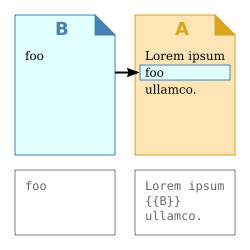
Back Transclusió Catalan Transklusion Danish Transklusion German Transclusión Spanish تراگنجانش FA Transclusion French Áthivatkozás Hungarian Transclusione Italian トランスクルージョン Japanese 트랜스클루전 Korean
This article includes a list of general references, but it lacks sufficient corresponding inline citations. (January 2016) |

In computer science, transclusion is the inclusion of part or all of an electronic document into one or more other documents by reference via hypertext. Transclusion is usually performed when the referencing document is displayed, and is normally automatic and transparent to the end user.[1] The result of transclusion is a single integrated document made of parts assembled dynamically from separate sources, possibly stored on different computers in disparate places.
Transclusion facilitates modular design (using the "single source of truth" model, whether in data, code, or content): a resource is stored once and distributed for reuse in multiple documents. Updates or corrections to a resource are then reflected in any referencing documents.
In systems where transclusion is not available, and in some situations where it is available but not desirable, substitution is often the complementary option, whereby a static copy of the "single source of truth" is integrated into the relevant document. Examples of both are provided by the ways in which they are both used in creating the content of Wikipedia, for example (see Wikipedia:Transclusion and Wikipedia:Substitution for more information). Substituted static copies introduce a different set of considerations for version control than transclusion does, but they are sometimes necessary.
Ted Nelson coined the term for his 1980 nonlinear book Literary Machines, but the idea of master copy and occurrences was applied 17 years before, in Sketchpad. Currently it is a common technique employed by textbook writers, where a single topic/subject needs to be discussed in multiple chapters. An advantage of this system in textbooks is that it helps data redundancy and keeps the book to a manageable size.
- ^ Glushko, Robert J., ed. (2013). The Discipline of Organizing. Cambridge, Massachusetts: MIT Press. p. 231. ISBN 9780262518505.